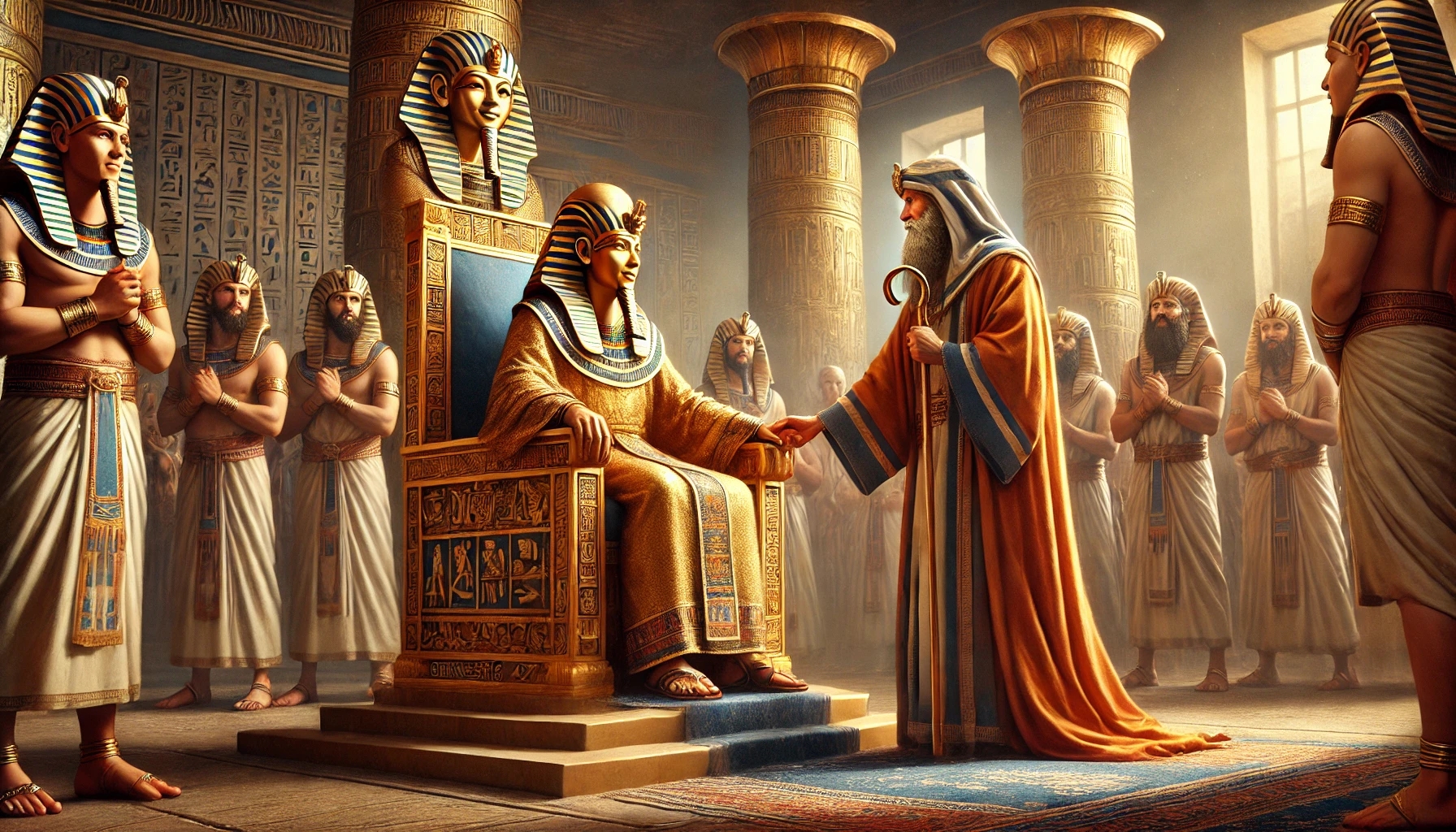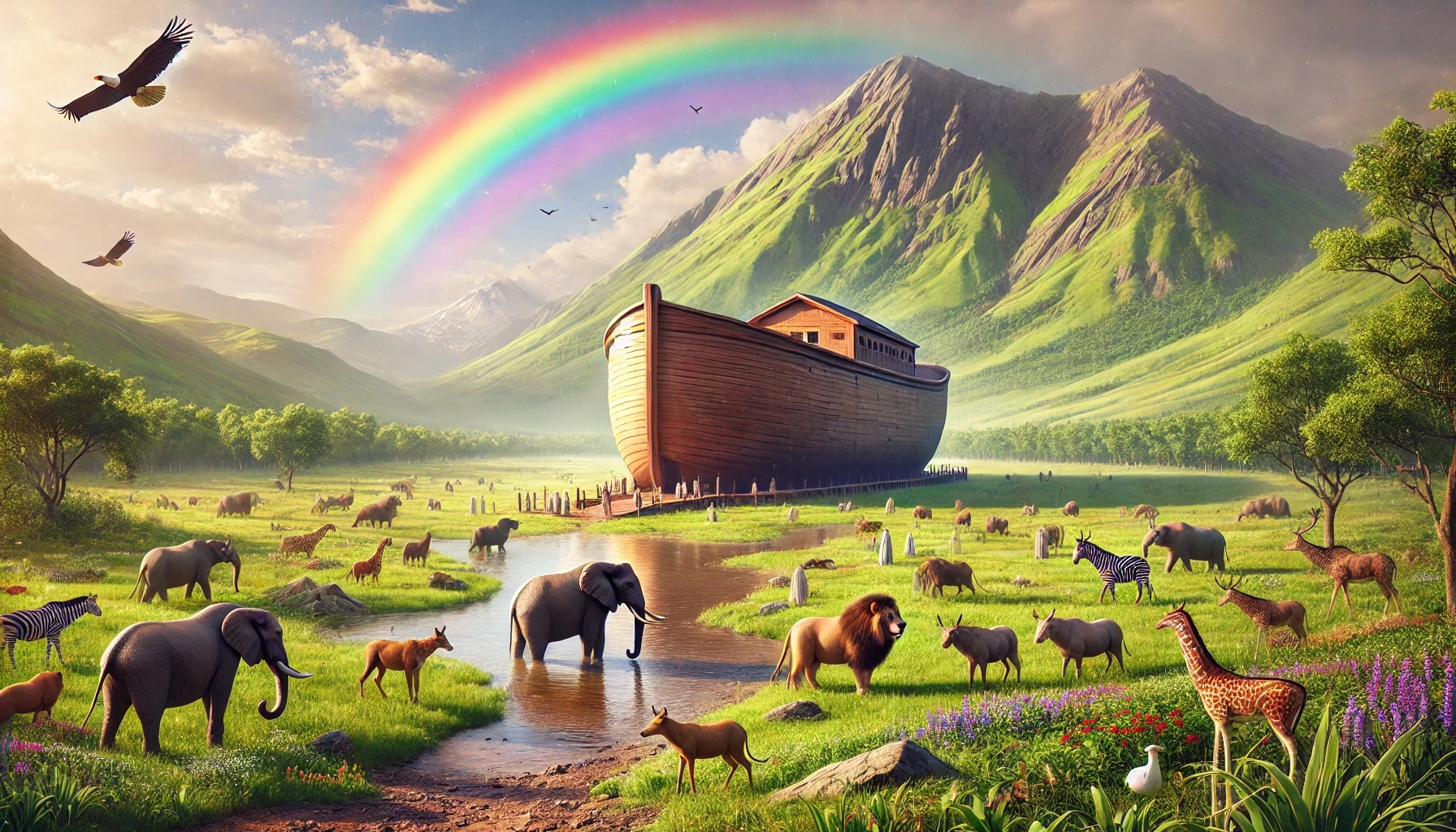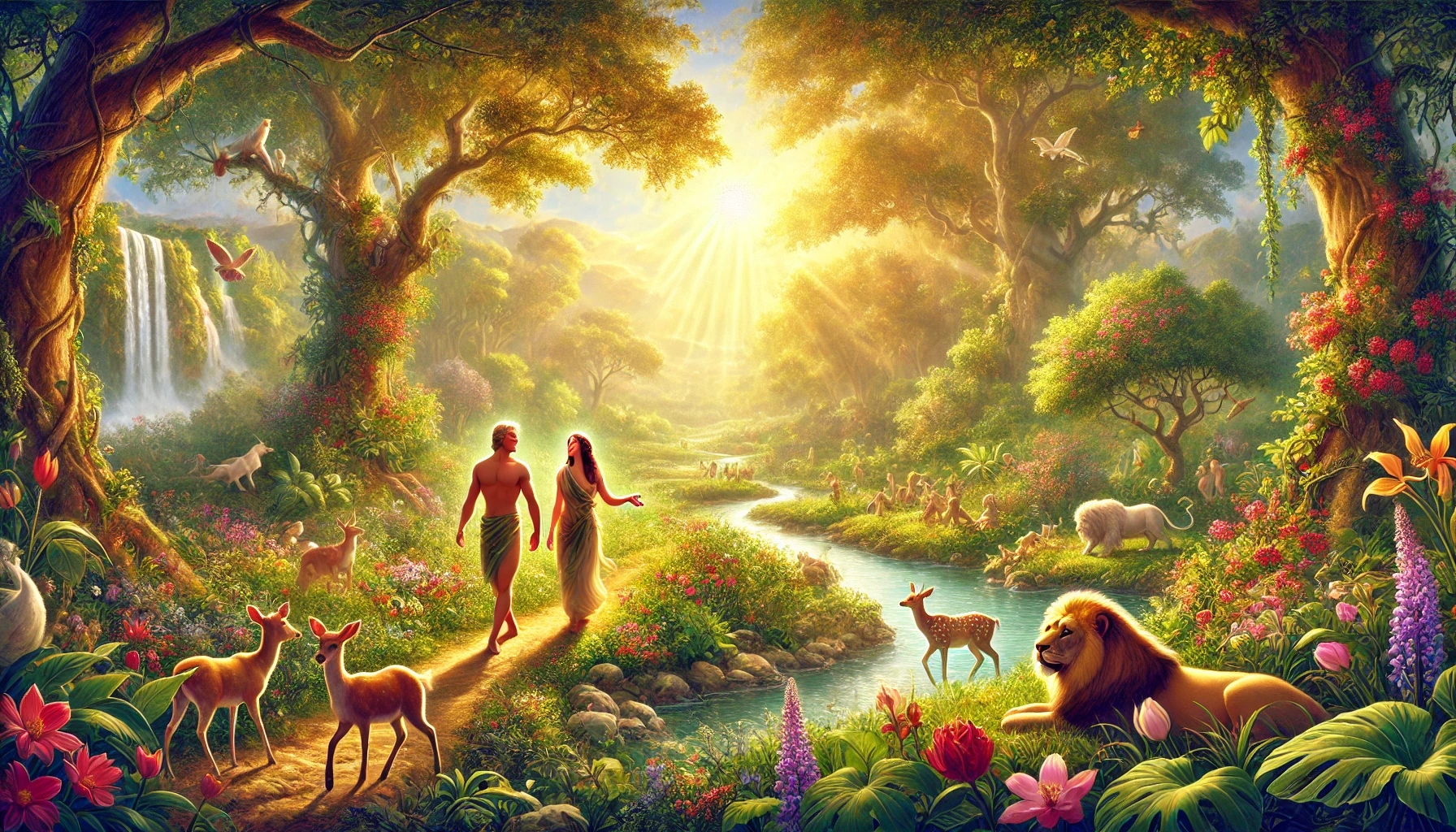2.06.2025 – Genesis Chapter 47 | BELIEVE HIS PROPHETS

📅 June 2, 2025
📖 DAILY BIBLE READING
✨ Genesis 47 – Jacob before Pharaoh and God’s Provision in Times of Need
🌍 God Provides in a Foreign Land: Jacob in Egypt, Hope Amidst Famine
══════════════════════════════════════════════
📜 Bible Text – Genesis 47 (KJV)
1 Then Joseph came and told Pharaoh, and said, My father and my brethren, and their flocks, and their herds, and all that they have, are come out of the land of Canaan; and, behold, they are in the land of Goshen.
2 And he took some of his brethren, even five men, and presented them unto Pharaoh.
3 And Pharaoh said unto his brethren, What is your occupation? And they said unto Pharaoh, Thy servants are shepherds, both we, and also our fathers.
4 They said morever unto Pharaoh, For to sojourn in the land are we come; for thy servants have no pasture for their flocks; for the famine is sore in the land of Canaan: now therefore, we pray thee, let thy servants dwell in the land of Goshen.
5 And Pharaoh spake unto Joseph, saying, Thy father and thy brethren are come unto thee:
6 The land of Egypt is before thee; in the best of the land make thy father and brethren to dwell; in the land of Goshen let them dwell: and if thou knowest any men of activity among them, then make them rulers over my cattle.
7 And Joseph brought in Jacob his father, and set him before Pharaoh: and Jacob blessed Pharaoh.
8 And Pharaoh said unto Jacob, How old art thou?
9 And Jacob said unto Pharaoh, The days of the years of my pilgrimage are an hundred and thirty years: few and evil have the days of the years of my life been, and have not attained unto the days of the years of the life of my fathers in the days of their pilgrimage.
10 And Jacob blessed Pharaoh, and went out from before Pharaoh.
11 And Joseph placed his father and his brethren, and gave them a possession in the land of Egypt, in the best of the land, in the land of Rameses, as Pharaoh had commanded.
12 And Joseph nourished his father, and his brethren, and all his father’s household, with bread, according to their families.
13 And there was no bread in all the land; for the famine was very sore, so that the land of Egypt and all the land of Canaan fainted by reason of the famine.
14 And Joseph gathered up all the money that was found in the land of Egypt, and in the land of Canaan, for the corn which they bought: and Joseph brought the money into Pharaoh’s house.
15 And when money failed in the land of Egypt, and in the land of Canaan, all the Egyptians came unto Joseph, and said, Give us bread: for why should we die in thy presence? for the money faileth.
16 And Joseph said, Give your cattle; and I will give you for your cattle, if money fail.
17 And they brought their cattle unto Joseph: and Joseph gave them bread in exchange for horses, and for the flocks, and for the cattle of the herds, and for the asses: and he fed them with bread for all their cattle for that year.
18 When that year was ended, they came unto him the second year, and said unto him, We will not hide it from my lord, how that our money is spent; my lord also hath our herds of cattle; there is not ought left in the sight of my lord, but our bodies, and our lands:
19 Wherefore shall we die before thine eyes, both we and our land? buy us and our land for bread, and we and our land will be servants unto Pharaoh: and give us seed, that we may live, and not die, that the land be not desolate.
20 And Joseph bought all the land of Egypt for Pharaoh; for the Egyptians sold every man his field, because the famine prevailed over them: so the land became Pharaoh’s.
21 And as for the people, he removed them to cities from one end of the borders of Egypt even to the other end thereof.
22 Only the land of the priests bought he not; for the priests had a portion assigned them of Pharaoh, and did eat their portion which Pharaoh gave them: wherefore they sold not their lands.
23 Then Joseph said unto the people, Behold, I have bought you this day and your land for Pharaoh: lo, here is seed for you, and ye shall sow the land.
24 And it shall come to pass in the increase, that ye shall give the fifth part unto Pharaoh, and four parts shall be your own, for seed of the field, and for your food, and for them of your households, and for food for your little ones.
25 And they said, Thou hast saved our lives: let us find grace in the sight of my lord, and we will be Pharaoh’s servants.
26 And Joseph made it a law over the land of Egypt unto this day, that Pharaoh should have the fifth part, except the land of the priests only, which became not Pharaoh’s.
27 And Israel dwelt in the land of Egypt, in the country of Goshen; and they had possessions therein, and grew, and multiplied exceedingly.
28 And Jacob lived in the land of Egypt seventeen years: so the whole age of Jacob was an hundred forty and seven years.
29 And the time drew nigh that Israel must die: and he called his son Joseph, and said unto him, If now I have found grace in thy sight, put, I pray thee, thy hand under my thigh, and deal kindly and truly with me; bury me not, I pray thee, in Egypt:
30 But I will lie with my fathers, and thou shalt carry me out of Egypt, and bury me in their buryingplace. And he said, I will do as thou hast said.
31 And he said, Swear unto me. And he sware unto him. And Israel bowed himself upon the bed’s head.
══════════════════════════════════════════════
🔵 Introduction
The forty-seventh chapter of the Book of Genesis describes a pivotal stage in the life of Jacob and his family: the beginning of their sojourn in Egypt, the land of exile. While famine and economic collapse shake the land, we see how God’s providence, through Joseph’s wisdom, provides for an entire nation—especially the chosen people. At the same time, Jacob meets the most powerful man in the world at that time, Pharaoh, not as a petitioner but as a blessing patriarch.
══════════════════════════════════════════════
🟡 Commentary
1. Arrival in Goshen and Jacob’s Blessing upon Pharaoh (Verses 1–10)
Joseph brings some of his brothers before Pharaoh. Their identity as shepherds is not a disadvantage but rather the very means by which God secures for them the territory He has prepared: Goshen, the fertile region best suited for grazing flocks. Notice especially the moment when Jacob blesses Pharaoh—a vivid picture of spiritual authority that transcends mere political power.
“And Jacob blessed Pharaoh.” (v. 7)
The people of God bring blessing into the world, even in a pagan environment.
2. Joseph’s Provision for His Family (Verses 11–12)
Joseph grants his father, his brothers, and their households the best land in Egypt. This illustrates how God’s provision often flows through mortal instruments. The unity of the patriarchal family underlines God’s unwavering faithfulness to His covenant.
3. The Economic Crisis—Famine in Egypt (Verses 13–26)
The famine is so severe that initially all the money in both Egypt and Canaan is used to buy grain. When money runs out, Joseph exchanges food for livestock; when livestock is gone, the people eventually sell their land and themselves into servitude to Pharaoh. Joseph’s prudent administration brings order out of chaos and ensures ongoing provision.
A repeated principle emerges: God uses crises to accomplish His purposes, yet He never abandons His children. Joseph’s wisdom stabilizes the nation at a time of profound scarcity.
4. Israel’s Blessing in Egypt (Verses 27–28)
Despite the hardship, the Israelites prosper and multiply in Goshen. Jacob lives seventeen years in Egypt, a testimony that even in exile and need, God can grant peace and blessing.
5. Jacob’s Final Request (Verses 29–31)
On his deathbed, Jacob asks Joseph to swear that he will not be buried in Egypt but will be taken back to Canaan to be laid to rest with his fathers. This request reveals Jacob’s enduring faith in God’s promise of the Promised Land. Though Egypt offers security, his heart remains fixed on the covenant inheritance.
══════════════════════════════════════════════
🟢 Summary
In Genesis 47, Jacob and his family settle in Egypt and experience God’s faithful provision during a severe famine. Joseph emerges as a wise leader who, by God’s empowerment, leads not only his own kin but all of Egypt through economic crisis. Jacob remains a man of faith to the very end, setting his gaze on God’s promises rather than Egypt’s temporary security.
══════════════════════════════════════════════
🔴 Message for Today
-
God provides even in foreign lands. Even when we are not in the “promised land,” God can sustain, protect, and cause us to flourish.
-
Blessing transcends circumstances. Just as Jacob blessed Pharaoh, we are called to extend spiritual blessing regardless of our environment.
-
True leadership emerges in crisis. Joseph’s handling of severe famine shows that faith and responsible stewardship must go hand in hand.
-
Keep your eyes on God’s promises. Like Jacob, who, despite living securely in Egypt, longed for the land of promise, we too must remain anchored in God’s eternal word, not simply in worldly comfort.
-
Times of crisis are opportunities for faith and growth. Individually and as a community, hardship can draw us closer to God and refine our trust in Him.
~~~~~🌍~~~~~

📆 June 1 – 7, 2025
📆 WEEKLY SPIRIT OF PROPHECY READING
📖 Ellen G. White │ Patriarchs and Prophets – Chapter 8
✨ After the Flood
📖 Read online here
══════════════════════════════════════════════
🔵 Introduction
The flood was over. The waters receded, and the ark came to rest. But life after the flood was not simply a continuation—it was a complete new beginning. In Chapter 8 of Patriarchs and Prophets, we read how God not only saves but also leads, protects, and grants new promises. Noah, the faithful preacher of righteousness, stands as a shining example of obedience, gratitude, and trust—even in times of deep uncertainty. The world that awaited him was no longer the same—but God had not changed: faithful, powerful, and full of grace.
══════════════════════════════════════════════
🟡 Commentary
1. Faith in the Test (The Months in the Ark)
The five months spent in the ark were a hard trial of patience. Without knowing when the waters would recede, Noah remained steadfast. He did not doubt God’s leading. Faith carried him and his family through the darkness.
Lesson: True trust is shown in the silence of waiting. God’s hand guides even when we cannot see it.
2. The Ordered Return (The Birds and Patience)
Noah sent out the raven and the dove in search of a sign. But he did not act impatiently—he left the ark only when God explicitly commanded him.
Lesson: Even when we see signs, our decisions must be guided by God’s word, not by circumstances alone.
3. The First Altar (Gratitude and Sacrifice)
Before he built a home for himself, Noah built an altar for God. He offered clean animals—an expression of his faith in the coming sacrifice of Christ.
Lesson: True gratitude first honors the One who gave everything—even when our own resources are scarce.
4. God’s Response: The New Covenant
God smelled the “pleasing aroma” of the sacrifice and declared a new covenant: there would be no more global flood. The rainbow became the sign of this covenant.
Lesson: God uses visible signs to assure us of His invisible faithfulness. His promises are for all generations.
5. A Changed Earth, A Changed Lifestyle
The earth was completely altered—landscape and ecosystem. God permitted the eating of meat as an adaptation to the new reality.
Lesson: God’s care and instructions adapt to human situations, but His moral will remains unchanged.
6. Hidden Treasures and Judgment
The flood buried not only bodies but also human pride, wealth, and idolatry. From this came coal, oil, and ore—evidence of God’s judgment but also of His mercy.
Lesson: What man abused, God transformed into a testimony of His power and justice.
7. Future Judgments: Fire Instead of Water
As water once cleansed the earth, so fire will purify it at the end. Volcanoes, earthquakes, and disasters are forerunners of Christ’s return.
Lesson: God’s warnings are not meant to frighten but to call us to repentance—His grace protects His people.
8. God’s Protection for His Own
Just as Noah was safe in the ark, God’s people will be protected by His power at the end. Psalm 91 becomes a personal promise amid chaos.
Lesson: The safe place is not geographical, but spiritual—under God’s wings.
══════════════════════════════════════════════
🟢 Summary
After the flood, Noah stepped into a radically changed world. But in the midst of death and destruction, his heart remained focused on God. His obedience, gratitude, and faith make him a model for all generations. And God responded with grace, promise, and protection. The rainbow stretching across the sky and throne remains the eternal sign: God’s covenant stands. And though future judgments will come, He will preserve those who trust in Him.
══════════════════════════════════════════════
🔴 Message for Us Today
In a world again marked by uncertainty, disasters, and moral decay, God calls us to live like Noah: with faith, obedience, and gratitude. When all that we know is shaken, we can rest assured:
God’s hand is still at the helm.
His covenant still stands. The rainbow in the sky is more than a natural phenomenon—it is a testimony of His faithfulness. And just as Noah was preserved in the midst of judgment, so we too can know:
The righteous are safe—not because they are strong, but because they trust in God.
So then, let us build altars of gratitude before we build houses. Let us give before we take. Let us believe before we see.
For the Lord, your Redeemer, says:
“My kindness shall not depart from you.” (Isaiah 54:10)
~~~~~🌍~~~~~

📆 June 1 – 7, 2025
📆 WEEKLY SPIRIT OF PROPHECY READING
📖 Ellen G. White │ Patriarchs and Prophets – Chapter 9
✨The Literal Week
📖 Read online here
══════════════════════════════════════════════
🔵 Introduction
The division of the week into seven days goes directly back to Creation: six days of work and one day of rest. In Chapter 9 of Patriarchs and Prophets, Ellen G. White explains how this divine principle was established in the Creation narrative and reaffirmed in the Law at Sinai. At the same time, she warns against modern misconceptions that stretch the Creation week into indefinite periods and thereby undermine the Fourth Commandment.
🟡 Commentary
1. Biblical Foundation of the Seven-Day Week
1.1 Creation Days as Literal Days
-
- Each Creation day consisted of an evening and a morning and was no different from our present days.
- God created for six days; on the seventh He rested, blessed, and sanctified that day as the Sabbath.
1.2 Confirmation at Sinai
-
- The Fourth Commandment refers directly to God’s own work of Creation (Exodus 20:8–11).
- This clear rationale underscores the literal meaning of a seven-day week.
2. Critique of Unbiblical Time Interpretations
2.1 Geological Theories vs. the Creation Account
-
- Geologists find fossil remains of large creatures and often interpret them as evidence for long ages of Earth’s history.
- White argues that many discoveries are remains of pre-Flood beings and do not contradict the biblical week.
2.2 Error and Unbelief
-
- Expanding the Creation days into indeterminate ages obscures the clear command of God.
- Satan’s aim is to blur the Fourth Commandment and stir rebellion against divine authority.
3. Harmony of Science and Revelation
3.1 Limits of Human Science
-
- Natural science cannot fully explain God’s creative activity.
- True education and research lead not to doubt but to obedience to God’s Word.
3.2 The Book of Nature and the Written Word
-
- Both complement each other: discoveries in nature and in Scripture affirm God’s power.
- Science without a biblical foundation drifts “without chart or compass” on unknown seas.
🟢 Summary
Ellen G. White emphasizes that the seven-day week begins with literal days in Creation and is confirmed by the Law at Sinai. Modern geological theories that assign vast, undefined periods to the Creation days contradict the clear biblical account. Science and revelation do not conflict, provided research remains within the framework of Holy Scripture.
🔴 Message for Us Today
The Fourth Commandment reminds us of God’s authority as Creator and highlights the importance of regular rest. In an age when scientific theories often extend beyond the Bible, we should always measure our understanding against God’s Word. Observing the Sabbath can renew our strength and bolster our faith.




















